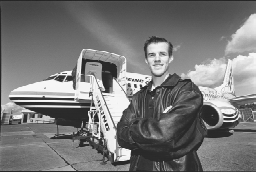Business in Beijing
SPU Senior Plays Important Role for Boeing in Merger of Aircraft Giants
by Clint Kelly
In his first taste of international corporate travel, SPU student Paul Sale served as a principal facilitator of a meeting for The Boeing Company in China. |
Paul Sale is no stranger to stiff competition. Twenty-one and lanky, the active Seattle Pacific University senior enjoys all sports, but excels at community club soccer and thrives on whitewater rafting. The accounting and finance double major from Portland, Oregon, resonates to the athlete's "need for speed."
But this summer Sale topped it all and took the international thrill ride of his young life. Chosen as an intern from among several dozen student candidates by The Boeing Company's China Group, Sale flew to Beijing and helped facilitate a critical meeting relating to the Boeing/McDonnell Douglas merger.
"It was a little shocking, but it's what you want if you want the whole business experience," says Sale, trying to express what it was like to be in on one of the biggest consolidations in corporate history. "Here I was the youngest person there, the only intern, thrown into the middle of a bunch of proprietary information in one of the world's most competitive industries.
"They included me in such a prestigious thing as the trip to China; they made sure that I knew I was an extremely important and valued employee. It says a lot about a company that would do all that for a two-month job."
Truth is, Sale was a vital member of the team. His supervisor had one eye on the calendar. The merger was imminent and a blizzard of details remained. Boeing needed someone articulate, highly ethical and a quick study.
One especially crucial task for the new intern would be the arrangement of the potentially delicate meeting between the McDonnell Douglas people in China, and Boeing representatives from Seattle. The two giant corporate competitors were used to playing hardball. That needed to change and the face-to-face meeting of 90 key players was a significant step in the right direction.
Sale came to the table with an impressive list of credentials for one so young. Besides his strong academic and athletic involvements, he had worked two summers in the offices of Portland General Electric and three years for the Controller's Office at Seattle Pacific. He'd been to Europe and Costa Rica, exuded a quiet self-confidence, and was the newly elected vice president of finance for the Associated Students of Seattle Pacific (annual budget: $420,000).
He also asked thoughtful, probing questions of the Boeing staff. How does Sale explain his forthright approach? "SPU trains you to jump right in. Students in the School of Business and Economics are routinely placed in positions like this, able to compete on equal footing with the big schools. I've never felt I lacked anything in my training."
Five interviews after he first submitted his resume, Sale was offered the Boeing internship. "He was pretty much the staff manager for the China meeting," says Linda Hsu, senior manager of Boeing's China Group. "Because he was with us every step of the way, he knew a lot more than the people who came in just for the meeting. Paul did the coordination and the record-keeping; he communicated the agenda and kept everyone abreast of developments."
The three-day trip to China required a crash course in foreign etiquette. Sale was assigned books and videos to help him understand the consequences of his actions.
"It's all so political," says Sale. "How a company portrays itself is important. It was a little unnerving not to speak the language and to be in the midst of so many people who didn't speak English. It was my first time in a place where I stuck out like that. I was taller than everyone else and felt very white."
The distinctions were as pronounced in matters professional. "Some of their physical motions have different meanings from ours and there are certain words you want to avoid. Titles are very important and you should possess a certain level of authority before you address another in authority. The meeting structure is all-important, who is allowed to speak and who should remain silent."
That he got it right comes as little surprise to his professors. Ian Stewart, professor of accounting, says it was a great honor for Sale to be chosen from among so many. "In many ways, Paul embodies the best about SPU in both leadership and service."
Fan Gates, associate professor of English, singles out Sale's independent thinking and maturity of insight, plus one other key trait: "I appreciate the depth and unsentimental nature of his faith...I wish there were a Paul Sale in every class I teach."
Boeing, too, liked the many sides of Sale. His post-China employee evaluation noted that he "fully met or exceeded" every criteria, including areas of personal values and ethical conduct. With characteristic understatement, Sale finesses the achievement by giving Seattle Pacific the nod: "The teamwork emphasis in my business studies really paid off."
And so did Sale's high-pressure summer performance. Boeing has since offered him a job after graduation in "joint ventures," the confidential future enterprises wing of the aerospace industry.
Now every time a jumbo jet flies over, count on Paul Sale to look up and smile.

Please read our disclaimer.
Send any questions, comments or correspondence about Response to
jgilnett@spu.edu
|
